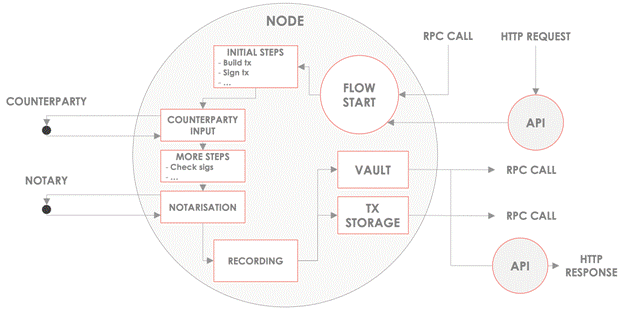What is a CorDapp blockchain and how it works
Recipe ID: hsts-r54
Self-paced training
We offer blockchain introduction, Hyperledger for system admin, Ethereum, Solidity, Corda R3, Hyperledger for developers, blockchain cybersecurity and more classes in self-paced video format starting at $60. Click here to learn more and register. For complete self-paced blockchain training, visit our Complete Blockchain Development Training page.
In this tutorial, we briefly review the Corda R3 Decentralized Application or DApp. This tutorial helps you to have a good understanding of Corda DApp architecture and you will use it in developing your future blockchain applications using Corda platform. In other words, in order to build distributed ledger application in Corda, you must fully follow and understand this tutorial.
CorDapps (Corda Distributed Applications) are distributed applications that run on the Corda platform. The goal of a CorDapp is to allow nodes to reach agreement on updates to the ledger. They achieve this goal by defining flows that Corda node owners can invoke over RPC:

CorDapp components
CorDapps take the form of a set of JAR files containing class definitions written in Java and/or Kotlin.
These class definitions will commonly include the following elements:
- Flows: Define a routine for the node to run, usually to update the ledger. They subclass FlowLogic
- States: Define the facts over which agreement is reached. They implement the ContractState interface
- Contracts, defining what constitutes a valid ledger update. They implement the Contract interface
- Services, providing long-lived utilities within the node. They subclass SingletonSerializationToken
- Serialisation whitelists, restricting what types your node will receive off the wire. They implement the SerializationWhitelist interface
But the CorDapp JAR can also include other class definitions. These may include:
- APIs and static web content: These are served by Corda’s built-in webserver. This webserver is not production-ready, and should be used for testing purposes only
- Utility classes
An example
Suppose a node owner wants their node to be able to trade bonds. They may choose to install a Bond Trading CorDapp with the following components:
- A BondState, used to represent bonds as shared facts on the ledger
- A BondContract, used to govern which ledger updates involving BondState states are valid
- Three flows:
- An IssueBondFlow, allowing new BondState states to be issued onto the ledger
- A TradeBondFlow, allowing existing BondState states to be bought and sold on the ledger
- An ExitBondFlow, allowing existing BondState states to be exited from the ledger
After installing this CorDapp, the node owner will be able to use the flows defined by the CorDapp to agree ledger updates related to issuance, sale, purchase and exit of bonds.
Writing and building apps that run on both Corda (open source) and Corda Enterprise
Corda and Corda Enterprise are compatible and interoperable, which means you can write a CorDapp that can run on both. To make this work in practice you should follow these steps:
- Ensure your CorDapp is designed per Structuring a CorDapp and annotated according to CorDapp separation. In particular, it is critical to separate the consensus-critical parts of your application (contracts, states and their dependencies) from the rest of the business logic (flows, APIs, etc). The former - the CorDapp kernel - is the Jar that will be attached to transactions creating/consuming your states and is the Jar that any node on the network verifying the transaction must execute.
Note
It is also important to understand how to manage any dependencies a CorDapp may have on 3rd party libraries and other CorDapps.
- Compile this CorDapp kernel Jar once, and then depend on it from your workflows Jar (or Jars - see below). Importantly, if you want your app to work on both Corda and Corda Enterprise, you must compile this Jar against Corda, not Corda Enterprise. This is because, in future, we may add additional functionality to Corda Enterprise that is not in Corda and you may inadvertently create a CorDapp kernel that does not work on Corda open source. Compiling against Corda open source as a matter of course prevents this risk, as well as preventing the risk that you inadvertently create two different versions of the Jar, which will have different hashes and hence break compatibility and interoperability.
Note
As of Corda 4 it is recommended to use CorDapp Jar signing to leverage the new signature constraints functionality.
- Your workflow Jar(s) should depend on the CorDapp kernel (contract, states and dependencies). Importantly, you can create different workflow Jars for Corda and Corda Enterprise, because the workflows Jar is not consensus critical. For example, you may wish to add additional features to your CorDapp for when it is run on Corda Enterprise (perhaps it uses advanced features of one of the supported enterprise databases or includes advanced database migration scripts, or some other Enterprise-only feature).
In summary, structure your app as kernel (contracts, states, dependencies) and workflow (the rest) and be sure to compile the kernel against Corda open source. You can compile your workflow (Jars) against the distribution of Corda that they target.
After finishing this tutorial, you can move on to below tutorials:
Build and Run Sample Corda Decentralized App for a Distributed Ledger
Develop your first Decentralized Application using Corda Distributed Ledger
Also, if you like to learn Corda or other blockchain development platforms via hands-on projects, the following classes are recommended:
Blockchain Hyperledger Fabric and Composer development- 30 hour course
Blockchain Ethereum development with Solidity- 30 hour course
Blockchain Corda R3 distributed ledger development- 30 hour course
Become Blockchain Certified Security Architect in 30 hours
Private and Custom Coding Classes
We offer private coding classes for beginners online and offline (at our Virginia site) with custom curriculum for most of our classes for $59 per hour online or $95 per hour in virginia. Give us a call or submit our Private Coding Classes for Beginners form to discuss your needs.